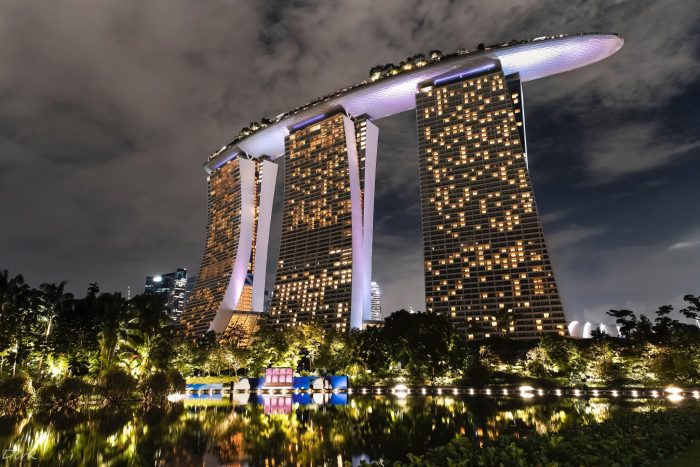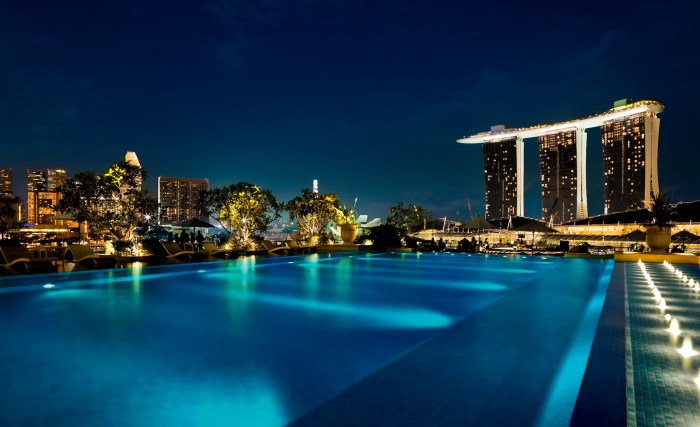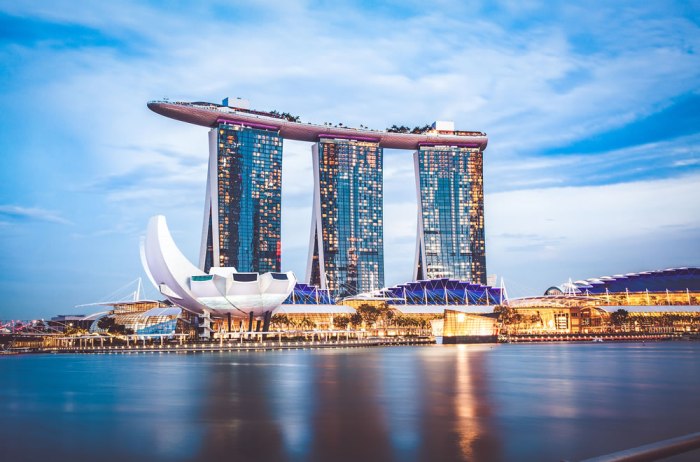Welcome to the captivating world of Singapore hotels, where luxury, convenience, and innovation converge to create an unforgettable travel experience. From opulent five-star resorts to charming boutique hotels, Singapore offers a diverse range of accommodations to suit every traveler’s needs and preferences.
As we delve into the vibrant tapestry of Singapore’s hotel industry, we will explore the various types of hotels available, analyze their strategic locations, and uncover the amenities and services that set them apart. We will also examine the factors influencing hotel pricing and promotions, as well as the latest marketing and distribution strategies employed by hotels to reach their target audience.
Hotel Industry Overview in Singapore
The hotel industry in Singapore has been experiencing a steady growth in recent years, driven by a combination of factors such as the country’s strong tourism sector, growing business travel, and the government’s efforts to promote the country as a leading destination for meetings, incentives, conferences, and exhibitions (MICE).
According to data from the Singapore Tourism Board (STB), hotel occupancy rates in Singapore have consistently remained above 80% in recent years, with an average occupancy rate of 84.7% in 2019. Average daily rates (ADR) have also been on the rise, with an average ADR of SGD220 in 2019.
Revenue per available room (RevPAR), which is a key indicator of hotel performance, has also shown a steady increase, with an average RevPAR of SGD186 in 2019.
The hotel industry in Singapore is highly competitive, with a number of major players in the market. Some of the largest hotel chains operating in Singapore include AccorHotels, Marriott International, and InterContinental Hotels Group. These chains operate a range of hotels, from budget-friendly options to luxury properties.
Market Trends
- The hotel industry in Singapore is expected to continue to grow in the coming years, driven by the country’s strong tourism sector and the government’s efforts to promote the country as a leading destination for MICE.
- The growth of the hotel industry in Singapore is also being supported by the government’s efforts to develop new tourism attractions, such as the Gardens by the Bay and the Marina Bay Sands.
- The hotel industry in Singapore is also facing a number of challenges, such as the rising cost of labor and the increasing competition from online travel agents (OTAs).
Government Initiatives
- The Singapore government is committed to supporting the growth of the hotel industry in the country.
- The government has introduced a number of initiatives to support the hotel industry, such as the Hotel Licensing Scheme and the Hotel Development Fund.
- The government is also working with the hotel industry to develop new tourism products and to promote Singapore as a leading destination for MICE.
Conclusion
The hotel industry in Singapore is a dynamic and growing industry. The industry is supported by a number of factors, such as the country’s strong tourism sector, the government’s efforts to promote the country as a leading destination for MICE, and the development of new tourism attractions.
Types of Hotels in Singapore
Singapore offers a diverse range of hotels to cater to different travelers’ needs and budgets. From luxurious retreats to mid-range options and budget-friendly accommodations, there is a hotel for every type of guest.
Luxury Hotels
Singapore is home to some of the world’s most opulent and luxurious hotels. These hotels offer exceptional amenities, personalized services, and breathtaking views of the city skyline or the waterfront. Some popular luxury hotels in Singapore include:
- Marina Bay Sands
- Ritz-Carlton, Millenia Singapore
- Capella Singapore
Mid-Range Hotels
Mid-range hotels in Singapore provide a balance of comfort, convenience, and affordability. They offer comfortable accommodations, essential amenities, and convenient locations near attractions and transportation hubs. Some popular mid-range hotels in Singapore include:
- Hotel Jen Orchardgateway Singapore
- Parkroyal on Pickering
- The Fullerton Hotel
Budget Hotels
For travelers on a budget, Singapore offers a range of affordable and comfortable budget hotels. These hotels provide basic amenities, clean accommodations, and convenient locations. Some popular budget hotels in Singapore include:
- Hotel 81
- Fragrance Hotel
- ibis Singapore on Bencoolen
Hotel Location and Accessibility

Hotel location is a crucial factor in Singapore’s hospitality industry. The city’s compact size and efficient public transportation system make it easy for guests to access different areas of Singapore from any hotel location. However, proximity to popular tourist attractions and business districts can significantly impact hotel demand and rates.
Popular Hotel Areas
Hotels in Singapore are concentrated in several key areas:
- Orchard Road:A major shopping and entertainment district, Orchard Road is home to numerous luxury and upscale hotels, catering to both leisure and business travelers.
- Marina Bay:The financial and cultural hub of Singapore, Marina Bay offers stunning views of the city skyline and proximity to attractions like Gardens by the Bay and the Singapore Flyer.
- Sentosa Island:A resort island just off the coast of Singapore, Sentosa Island features a wide range of hotels, from family-friendly resorts to secluded luxury escapes.
- Chinatown:A vibrant cultural district, Chinatown offers a mix of budget-friendly hotels and boutique accommodations, providing easy access to historical landmarks and local markets.
- Little India:A colorful and lively neighborhood, Little India is known for its authentic Indian cuisine and budget-friendly accommodations, catering to both backpackers and budget-conscious travelers.
Transportation Options
Singapore’s public transportation system is highly efficient and reliable, with a network of MRT (metro) lines, buses, and taxis. This makes it easy for guests to explore the city from any hotel location. Additionally, many hotels offer shuttle services to and from the airport and popular attractions.
Hotel Amenities and Services

Singapore’s hotels offer a wide range of amenities and services to cater to the diverse needs of their guests. These amenities and services play a crucial role in enhancing guest satisfaction and loyalty.
Common Amenities and Services
- Complimentary Wi-Fi
- 24-hour room service
- Concierge services
- Fitness centers
- Swimming pools
- Business centers
These amenities provide convenience, comfort, and connectivity for guests, making their stay more enjoyable and productive.
Impact on Guest Satisfaction and Loyalty
Well-appointed amenities and services significantly impact guest satisfaction. Studies have shown that guests are more likely to return to hotels that offer amenities and services that meet or exceed their expectations. Satisfied guests are also more likely to recommend the hotel to others, contributing to increased brand reputation and loyalty.
Unique and Innovative Amenities and Services
To differentiate themselves and cater to discerning guests, some hotels in Singapore offer unique and innovative amenities and services:
- Pet-friendly accommodations
- Personalized butler service
- Rooftop bars with panoramic city views
- In-room virtual reality experiences
- Wellness programs and spa treatments
These unique offerings create memorable experiences and attract guests seeking a more personalized and luxurious stay.
Hotel Pricing and Promotions
Hotel pricing in Singapore is influenced by various factors, including location, hotel type, amenities, and seasonality. Hotels in prime locations, such as the Central Business District (CBD) and Orchard Road, typically command higher prices than those in less central areas.
Luxury hotels and those with extensive amenities, such as swimming pools, fitness centers, and restaurants, also tend to have higher rates. The time of year also plays a role in pricing, with peak season (typically during the summer and major holidays) seeing higher rates than off-season.
Pricing Strategies
Hotels in Singapore employ a variety of pricing strategies to attract guests. These include:
- Rack rates:The standard published room rates.
- Corporate rates:Discounted rates offered to businesses and organizations with which the hotel has a contract.
- Weekend rates:Reduced rates offered during weekends to attract leisure travelers.
- Promotional rates:Special rates offered for a limited time or to specific groups of guests, such as seniors or families.
Promotions
In addition to pricing strategies, hotels in Singapore also offer a variety of promotions to entice guests. These include:
- Package deals:Bundled packages that include hotel accommodation, meals, and activities.
- Loyalty programs:Rewards programs that offer discounts, upgrades, and other perks to repeat guests.
- Online booking discounts:Discounts offered for booking rooms online.
- Early bird discounts:Discounts offered for booking rooms in advance.
Impact of Seasonal Demand and Special Events
Seasonal demand and special events can significantly impact hotel pricing in Singapore. During peak season, when demand for hotel rooms is high, rates tend to be higher. Special events, such as the Singapore Grand Prix and the Singapore Airshow, can also drive up hotel prices due to increased demand for accommodation.
Singapore is a bustling metropolis with a wide range of accommodation options, including the stylish arbor biz hotel. This contemporary hotel offers modern amenities and a convenient location in the heart of the city. Whether you’re visiting Singapore for business or pleasure, you’ll find that arbor biz hotel provides a comfortable and stylish stay.
Hotel Marketing and Distribution
Hotels in Singapore employ various marketing channels to reach their target audience and promote their services. These channels include both traditional and digital platforms, with a strong emphasis on online distribution.
Online travel agents (OTAs) play a significant role in hotel distribution in Singapore. OTAs such as Expedia, Booking.com, and Agoda provide a convenient platform for travelers to search, compare, and book hotel accommodations. They offer a wide selection of hotels, competitive pricing, and user-friendly interfaces, making them a popular choice for travelers.
Emerging Marketing Trends and Technologies
In recent years, the hotel industry has witnessed the emergence of new marketing trends and technologies that are reshaping the way hotels reach and engage with potential guests.
- Social Media Marketing:Social media platforms like Facebook, Instagram, and Twitter have become powerful tools for hotels to connect with their target audience, showcase their properties, and drive bookings.
- Content Marketing:Creating and distributing valuable content, such as blog posts, articles, and videos, helps hotels establish themselves as thought leaders and attract potential guests who are actively seeking information about travel and accommodation.
- Mobile Marketing:With the increasing use of smartphones, hotels are leveraging mobile marketing channels to reach travelers on the go. This includes mobile-friendly websites, mobile apps, and targeted advertising campaigns.
- Artificial Intelligence (AI):AI-powered chatbots and virtual assistants are being used by hotels to provide personalized assistance to guests, answer inquiries, and facilitate bookings.
- Virtual Reality (VR) and Augmented Reality (AR):VR and AR technologies are emerging as innovative ways for hotels to showcase their properties and provide immersive experiences to potential guests.
Hotel Sustainability and Green Practices

Sustainability has become a significant focus for the hotel industry in Singapore. Hotels are recognizing the importance of environmental responsibility and are adopting various green practices to reduce their impact on the environment.
Some of the environmental initiatives and green practices adopted by hotels in Singapore include:
Energy Conservation
- Using energy-efficient appliances and lighting
- Installing solar panels to generate renewable energy
- Implementing energy management systems to optimize energy usage
Water Conservation
- Installing low-flow fixtures and appliances
- Collecting rainwater for irrigation
- Recycling wastewater for non-potable purposes
Waste Management
- Implementing recycling programs for paper, plastic, glass, and metal
- Composting organic waste
- Reducing single-use plastics
Sustainable Procurement
- Purchasing eco-friendly products and materials
- Sourcing from local suppliers to reduce transportation emissions
- Working with suppliers who share sustainability values
Benefits of Sustainable Practices
Implementing sustainable practices can provide numerous benefits for hotels, including:
- Reduced operating costs through energy and water savings
- Improved guest satisfaction and loyalty
- Enhanced brand reputation and positive public relations
- Compliance with environmental regulations
Challenges of Sustainable Practices
While there are many benefits to implementing sustainable practices, there are also some challenges:
- Initial investment costs can be high
- Changing guest behavior can be difficult
- Balancing sustainability with guest comfort and expectations
Hotel Technology and Innovation

Technology has revolutionized the hotel industry in Singapore, transforming the guest experience and improving hotel operations.
Mobile Apps, Singapore hotel
Mobile apps have become indispensable for hotels in Singapore. Guests can use apps to book rooms, check in and out, access hotel services, and communicate with staff. Apps also provide personalized recommendations and allow guests to manage their loyalty rewards.
Smart Rooms
Smart rooms are becoming increasingly common in Singapore hotels. These rooms feature integrated technology that allows guests to control lighting, temperature, and entertainment with their smartphones or voice commands. Smart rooms also offer enhanced security and convenience, with features such as keyless entry and motion-activated lighting.
Singapore hotels offer a wide range of accommodation options, from budget-friendly hostels to luxurious resorts. If you’re looking for a more lively and vibrant atmosphere, consider exploring Kuta Bali , known for its beautiful beaches, bustling nightlife, and vibrant cultural scene.
After a day of exploring Kuta Bali, return to the comfort of your Singapore hotel for a relaxing and rejuvenating stay.
Other Technological Advancements
Other technological advancements in Singapore hotels include:
- Self-service kiosks for check-in and check-out
- Virtual reality and augmented reality experiences
- Artificial intelligence-powered chatbots for customer service
- Smart lighting and energy management systems
Benefits of Technology
Technology is enhancing the guest experience in Singapore hotels in several ways:
- Increased convenience and personalization
- Improved communication and service
- Enhanced security and safety
- More immersive and memorable experiences
Technology is also improving hotel operations by:
- Streamlining processes and reducing costs
- Improving staff productivity and efficiency
- Providing data and insights for better decision-making
- Creating new revenue streams
Hotel Investment and Development
Singapore’s hotel investment landscape presents both opportunities and challenges for investors. The city-state’s robust tourism industry, coupled with government initiatives to support the hospitality sector, makes it an attractive destination for hotel development.
Factors driving hotel development and investment decisions in Singapore include economic growth, tourism demand, government incentives, and market competition. Investors carefully consider these factors when assessing the potential return on their investments.
Opportunities for Hotel Investors
- Strong tourism demand:Singapore’s tourism sector is expected to continue growing, driven by factors such as increased air connectivity, the rise of budget travel, and the city’s reputation as a global business and leisure destination.
- Government incentives:The Singapore government offers various incentives to encourage hotel development, such as tax breaks, grants, and land subsidies.
- Market competition:Singapore’s hotel market is highly competitive, which drives investors to innovate and differentiate their offerings to attract guests.
Challenges for Hotel Investors
- Land scarcity:Singapore’s limited land availability can make it challenging to secure suitable sites for hotel development.
- High construction costs:The cost of land and labor in Singapore is relatively high, which can impact the profitability of hotel investments.
- Fluctuating occupancy rates:Occupancy rates in Singapore’s hotels can be affected by factors such as seasonality, economic conditions, and competition from new hotels.
Hotel Industry Outlook and Future Trends: Singapore Hotel
The hotel industry in Singapore is poised for continued growth in the coming years, driven by factors such as increasing tourism, rising disposable incomes, and the development of new tourism attractions. However, the industry is also facing challenges, such as the emergence of new technologies, changing consumer preferences, and economic fluctuations.
Singapore hotels are a great choice for travelers looking for a luxurious and convenient stay. The city-state is home to a wide range of hotels, from budget-friendly options to five-star resorts. For those looking for a more vibrant and bustling city experience, kuala lumpur may be a better choice.
However, for those seeking a more relaxed and tranquil getaway, Singapore hotels offer an ideal retreat.
Impact of Emerging Technologies
- Artificial intelligence (AI)is being used to automate tasks, personalize guest experiences, and improve operational efficiency.
- Virtual reality (VR)and augmented reality (AR)are being used to create immersive experiences for guests, such as virtual tours of hotel rooms and attractions.
- Blockchain technologyis being used to improve security and transparency in hotel operations, such as managing guest data and reservations.
Changing Consumer Preferences
- Millennialsand Generation Zare increasingly becoming the target market for hotels, and they have different preferences than older generations.
- These younger generations are looking for hotels that are sustainable, tech-savvy, and offer unique experiences.
- They are also more likely to book their hotel stays online and through mobile devices.
Economic Factors
- The global economy is expected to continue to grow in the coming years, which will lead to increased travel and tourism.
- However, economic downturns can have a negative impact on the hotel industry, as people are less likely to travel and spend money on leisure activities.
- Hotels need to be prepared for economic fluctuations and adjust their strategies accordingly.
Last Recap
As the hotel industry in Singapore continues to evolve, we can expect to witness further advancements in technology, sustainability, and guest experience. Hotels will need to adapt to changing consumer demands and economic conditions to maintain their competitive edge. By embracing innovation and focusing on delivering exceptional service, Singapore hotels will continue to play a vital role in the city’s tourism and hospitality sectors.
Commonly Asked Questions
What are the most popular types of hotels in Singapore?
Singapore offers a wide range of hotels, from luxury five-star resorts to budget-friendly options. Some of the most popular types include luxury hotels, mid-range hotels, and boutique hotels.
Where are the best areas to stay in Singapore?
The best areas to stay in Singapore depend on your preferences and budget. For luxury and convenience, consider staying in the Central Business District (CBD) or Marina Bay. For a more local experience, try Chinatown or Kampong Glam.
How much does it cost to stay in a hotel in Singapore?
Hotel prices in Singapore vary depending on the type of hotel, location, and time of year. On average, you can expect to pay around SGD 100-200 per night for a mid-range hotel and SGD 300-500 per night for a luxury hotel.